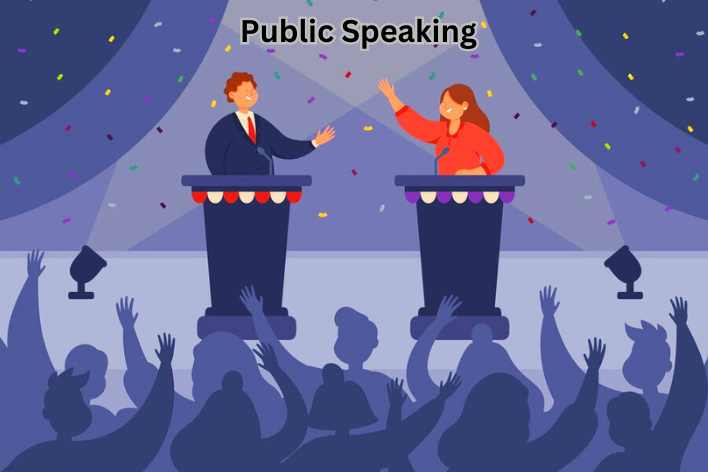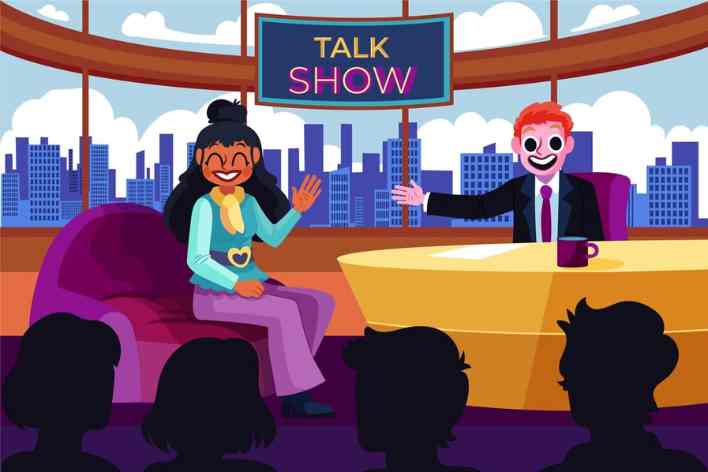Public Speaking for Kids
By Pinkey Sharma |
Date 30-07-2024

Table of Contents
Admissions Open for
Have you ever wondered how it feels to speak in front of hundreds of people, say something that sticks with the audience, and create a lasting impact? This powerful skill is called Public Speaking.
Understanding Public Speaking
Public speaking is the art of delivering a speech to a live audience to educate, inform, and entertain them. While it is a valuable skill to have, it is not a common one. Many people have some experience speaking in front of others, but proficiency levels vary widely. Public speaking often brings up fear and anxiety, which can prevent people from delivering effective speeches. Despite its benefits in the real world, such as boosting confidence and improving communication, public speaking is not universally common due to fear, lack of formal training, and limited practice opportunities.
Importance of Public Speaking for Kids
Public speaking for kids goes beyond just polished communication skills; it builds critical thinking and improves confidence. When taught early, kids learn to be confident and develop strong personalities. It fosters growth, pushes children to step out of their comfort zones, and learn from their mistakes.
Preparing for a speech requires more than memorizing lines; it involves critical thinking and creativity. Kids learn to research topics, analyze information, and structure arguments. They develop the skill to think on their feet, respond to questions, and adapt their presentations based on audience feedback. These cognitive abilities not only enrich their academic performance but also prepare them to tackle complex challenges in the real world.
Public speaking empowers children to advocate for causes they believe in. By confidently stating their perspective, they can shape minds and cultivate change, ultimately contributing to making the world a better place for all.
In essence, public speaking is a foundational skill that prepares children for future academic and career success and empowers them to become confident, articulate, and influential individuals capable of making meaningful contributions to society.
As per research by WorldMetrics.org 59% of recruiters today, consider public speaking to be an important skill for jobs. The research also states that more than 60% of people want to improve their public speaking skills due to its benefits like being eligible for a salary hike by 10%. Wouldn't your child’s professional life start on the right foot with public speaking?

Choosing the Right Public Speaking Program for Your Child
Choosing the right public speaking program for your child can be challenging. It involves considering and aligning factors such as interests, hobbies, and learning styles. Here are some key pointers to help you make an informed decision:
-
Understanding the Why:
Realizing the importance of public speaking and knowing the exact need for learning the skills are two separate factors. As a parent, it is important to be clear about why your child should participate in a public speaking program. Is it to boost their confidence? or Improve their communication skills? Public speaking benefits your child in multiple ways, so it's vital to channel efforts in a direction that yields the maximum benefit. Having a clear objective, such as building confidence, enhancing communication skills, or developing leadership skills, will help you make an informed decision.
-
Child’s Interest:
Every child is different and will have a different learning technique. While some programs focus on general public speaking and speech skills, others may emphasize debate, storytelling, presentations, and more. Choose the one that fits your child's needs perfectly.
-
Educator Qualifications:
It's crucial that you select an instructor whose beliefs and thoughts are aligned with your parenting philosophy. A positive and motivated teacher will impact the child’s point of view about public speaking and not set fears for the same.
-
Starting at the Right Age:
Even though age is just a number, starting sooner helps us to miss fewer opportunities in life. Ishita Katyal, India's youngest TEDx speaker & author who conducted her first Ted talk at a mere age of 8, is a perfect example of the benefits of starting public speaking at a young age. She stands out for her confidence and abundant ability to think outside the box. Her belief that one must be whoever they want to be, at any age, is truly inspiring and something you should consider for your child.
All in all, with the right support and guidance, public speaking can help children build essential foundations in life.
Overcoming Stage Fright, Anxiety, and Performance Pressure in Kids
Public speaking often triggers anxiety and stage fright in children. Here are strategies to help them overcome these challenges:
-
Educating Your Child:
Set the right expectations with your child to help them prepare from the beginning and avoid stage shock. Ensure your child understands that nervousness is normal and feeling butterflies in the stomach before delivering a speech is natural. Once the child is aware of their feelings, they can practice deep breathing and use simple chants as quick impactful solutions. Deep breaths help reduce their heart rate, and calm their anxiety, while simple chants distract their minds from fear.
-
Start Small:
Kids should start their public speaking journey in small and supportive environments like family gatherings or speaking among friends. Schools that conduct class activities with kids performing recitals positively contribute to this process. Public speaking in a safe environment helps kids develop confidence and reduces chances of feeling anxious or nervous.
-
Selecting the Right Topic & Drafting Content:
Be strategic in selecting speech topics. Kids often love to talk about their interests, so finding a topic they are passionate about can prevent discomfort. Let your child participate in writing their speech. A self-written speech increases the likelihood of a strong delivery. Once kids are comfortable with the content, the fear of missing key points diminishes, helping them overcome nerves about making mistakes.
-
Practice:
As the saying goes, practice makes perfect. Ensure your child practices their speech enough times before stepping onto the stage. Regular practice builds familiarity thus reducing anxiety.
-
Group Engagement:
Involve your child in group activities and discussions. Participating in group classes habituates them to representing themselves among new crowds. The habit of being in a group setting can reduce anxiety about public speaking.
-
Model Good Public Speaking:
Be a role model for your child. Share stories of your own public speaking experiences and how you overcame fears. Empathy goes a long way in reassuring your child.
-
Words of Appreciation and Encouragement:
Celebrate small wins and offer words of encouragement. Let your child know you believe in them and support them, regardless of wins and losses.
These simple techniques will help you to create a positive mindset about public speaking for your child and benefit them in the long run.

Public Speaking Activities for Kids
Engaging kids in activities to build public speaking skills can be both educational and fun. Here are some simple activities to boost their confidence:
-
Storytelling:
Encourage children to share stories of fun incidents and experiences to boost their confidence in speaking in front of live audiences.
-
Reciting Poems or Rhymes:
Recitation encourages kids to memorize and present their pieces, cultivating multiple skills simultaneously.
-
Role-Playing Activities:
Role-playing helps kids take on different roles, adapt speech styles, and think creatively.
-
Impromptu Speaking Activities:
Impromptu speaking helps kids think on their feet and organize their thoughts quickly before presenting, a useful skill for spontaneous presentations in the corporate world.
-
Debates:
Participating in school debates expands kids' horizons, teaching them active listening skills and how to craft compelling arguments.
-
Extracurriculars like Drama and Dance Performances:
Participating in activities where kids perform on stage builds confidence from an early age.
-
Group Activities and Games:
Encourage your child to participate in group games to develop skills like active listening, team coordination, collaboration and leadership, all closely related to public speaking.
Balancing Extracurricular Activities with Academics
Balancing extracurricular activities with academics is crucial. Public speaking enhances academic performance by:
-
Active Class Participation:
Kids with public speaking skills naturally participate in class Q&As and activities, leading to better comprehension and retention of information.
-
Memorization:
Memorizing speech or presentation key points helps children develop memory skills which are directly beneficial for academic tasks.
-
Developing Vocabulary:
Writing speeches and actively communicating with diverse audiences enriches children's vocabulary, benefiting their academic performance.
-
Improving Focus:
Participating in public speaking activities like debates improves concentration and attention to detail.
-
Problem-Solving Skills:
Through speeches and public speaking activities, children learn to think creatively and make decisions quickly, enhancing problem-solving abilities.
-
Research Skills:
Preparation for public speaking involves thorough primary and secondary research, conditioning children to research effectively for academic projects, essays, and papers.
-
Broadening Horizons:
Engaging in public speaking from a young age helps children adapt to new concepts, broadening their intellectual capabilities.
-
Time Management:
Public speaking requires preparation within a set timeframe, teaching students effective time management, crucial for balancing multiple academic responsibilities.
-
Prioritization:
Students learn to prioritize tasks and allocate sufficient time for preparation, improving overall efficiency.
Inculcating Public speaking in the kids' daily routine could be as simple as playing digital games. In case you worry about screen time, here are some offline games that might help you develop public speaking skills. Here is a fun speech game & video that caught my attention -
-
Teach Wonderful.
-
Impromptu Speech
In conclusion, public speaking is more than just a skill—it's a gateway to confidence, academic success, and personal growth for kids. By encouraging and guiding our children to become effective communicators, we equip them with tools that will serve them well throughout their lives. As parents, teachers, and mentors, we have the opportunity to nurture this vital skill in a fun and supportive environment. Whether through structured activities, engaging games, or simple daily practices, every effort contributes to their journey toward becoming confident, articulate, and resilient individuals.

Frequently Asked Questions about Public Speaking for Kids
How do I teach my child public speaking?
Encourage your child to speak before small, friendly audiences, including family and friends. This will build his confidence through fun activities like storytelling or role play. But be sure to give him constructive feedback and express admiration of his efforts to boost his self-esteem.
How would you start a speech on kids?
Start with an extremely composed word of welcome, introduce yourself if you must, then hit them straight away with something interesting and thought-provoking, either an interesting fact or a rhetorical question that will get the audience thinking. Ensure your introduction is light and straightforward, setting the audience up for the appropriate mood for the rest of the speech.
What are the 5 essential elements in public speaking?
-
Clarity: Plain, clear articulation
-
Confidence: Self-assurance in one's manner
-
Eye Contact: Maintaining effective visual interaction
-
Body Language: Good use of gestures and posture
-
Organization: Logical form and coherence.
What does public speaking mean to a child?
Public speaking to a child simply means clear and confident speech in front of people. This means the sharing of ideas, telling stories, and communicating with the audience.
Empower your child with the confidence to shine on stage!
Liked what you read? Feel free to share this article with your friends and spread the knowledge!
CBSE Schools In Popular Cities
- CBSE Schools in Bangalore
- CBSE Schools in Mumbai
- CBSE Schools in Pune
- CBSE Schools in Hyderabad
- CBSE Schools in Chennai
- CBSE Schools in Gurgaon
- CBSE Schools in Kolkata
- CBSE Schools in Indore
- CBSE Schools in Sonipat
- CBSE Schools in Delhi
- CBSE Schools in Rohtak
- CBSE Schools in Bhopal
- CBSE Schools in Aurangabad
- CBSE Schools in Jabalpur
- CBSE Schools in Jaipur
- CBSE Schools in Jodhpur
- CBSE Schools in Nagpur
- CBSE Schools in Ahmednagar
- CBSE School In Tumkur

Call Us to know more about Orchids
Swipe Up


.jpg&w=1920&q=80)













